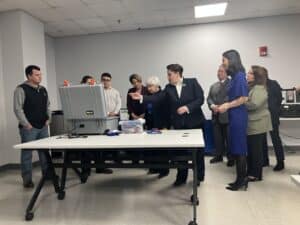
Gov. Maura Healey, Secretary of the Treasury Janet Yellen and Boston Mayor Michelle Wu toured a program at the Center for Smart Building Technology at Roxbury Community College on Wednesday, Jan. 10, 2024. Photo by Alison Kuznitz | State House News Service
When she toured Roxbury Community College with Treasury Secretary Janet Yellen Wednesday, part of a trip to promote the Biden administration’s clean energy polices, Boston Mayor Michelle Wu said she pressed the secretary on the impact high interest rates were having on housing construction.
“I had a little bit of one-on-one time with her and raised this issue. We know interest rates are up to drive inflation down, but it does make it very difficult for us to get the market to be able to produce more housing,” she told WCVB-TV anchor Ed Harding and political reporter Sharman Sacchetti during a taping of the channel’s “On the Record” public affairs show, which aired Sunday. “So we talked about the trade-offs there and the hope for the future. We’re trying to do everything we can at the city level, as cities everywhere are adjusting to this new national situation.”
It was the mayor’s first major media appearance since delivering her State of the City address last week, typically a mayor’s venue for laying out the initiatives she will undertake in the next year.
The Federal Reserve’s high interest rate policies have helped curb housing development across the state in the last 18 months. It’s left some commercial real estate industry leaders to warn of few, if any, multifamily developments will break ground in Boston this year even though senior Fed policymakers project that they could reduce the central bank’s benchmark interest rate by 75 basis points over the course of 204.
A city-commissioned study of housing production incentive ideas by top Harvard University and Federal Reserve economists, first reported by the Boston Business Journal, concluded that interest rates are currently so high that any city tax break might not have much of an effect on construction.
Despite offering a sizable tax break for downtown office-to-residential conversions, Wu’s administration has only been able to drum up interest from eight of the costly, labor-intensive projects – projects that would total around 170 units, the mayor told WCVB.
In addition to the cost of capital, however, real estate industry leaders also point the finger at progressive policies the mayor has championed like rent control, saying they’re deterring investors. Interviewing Wu, WCVB’s Harding noted that the city’s local-option rent control proposal, which would cap annual rent hikes at around 10 percent, appeared to have stalled in the state legislature, with no Beacon Hill power brokers taking up the idea. When he pressed Wu on whether she was abandoning the policy, she said she was not.
“Rent control is not a silver bullet. It does not fix the housing crisis, but it plays a really important role in helping people hang onto their homes while we’re doing everything else,” she said. “We’re going to keep working with [state legislators] because we know we all share a priority in trying to provide relief for our residents.”
Housing costs, she said, were “the biggest stress all across our city and region,” something business groups have also echoed in their calls to make the state more economically competitive.






